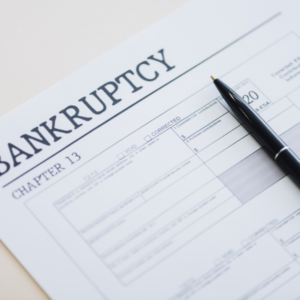Small Business Bankruptcy Attorneys in Cary, NC

If you’re a small business owner, you’ve likely seen significant ups and downs when it comes to your company’s finances. If you find yourself struggling to pay your bills, pay your employees and vendors, and keep your business afloat, filing for small business bankruptcy might be the best way to modify, reduce, or eliminate debt and get your make your business and/or personal balance sheet manageable.
Depending on the specifics of your situation, you might want to consider either Chapter 13 or small business Chapter 11 bankruptcy. To know which option is right for you, call the experienced bankruptcy lawyers at Sasser Law Firm. We’ve been helping small business owners just like you for over 20 years in North Carolina.
For many business owners, bankruptcy is a tool that can help when your financial obligations become too much to handle. Our bankruptcy attorneys can explain the process and all the options that are available to you. Whether you decide to file for bankruptcy or not, we will be happy to discuss your options.
If you hire us, you will be hiring a firm of 3 board-certified bankruptcy lawyers. All of our bankruptcy lawyers have passed an exam, are subjected to enhanced continuing education requirements, and have been reviewed by peers.
With our bankruptcy legal knowledge and skills, we can attempt to guide you out of your financial difficulties so you can make a fresh start. Furthermore, we care about our clients and will treat you with respect and professionalism. We take pride in the work we do and are passionate about helping business owners like you, get back on the path to success.
Take the first step toward financial freedom for your business and/or personal financial situation by calling us or reaching out to us online.
What Is the Difference Between Chapter 13 and Chapter 11 Bankruptcy?
For small businesses, the main differences between Chapter 11 and Chapter 13 bankruptcies are who is eligible to file for each type, the cost of doing so, and how long the process is going to take.
In general, almost any individual or business can file for Chapter 11 bankruptcy. This includes:
- Individuals
- Limited liability companies (LLCs)
- Partnerships
- Joint ventures
- Businesses
There is no specified debt limit, nor is there a set required income. However, this form of bankruptcy can be complex and expensive. When you file for bankruptcy Chapter 11, your business will be allowed to stay open while it reorganizes its finances and obligations. Businesses are often allowed to establish a reorganization plan and continue operations.
To qualify for Chapter 13 bankruptcy, individuals have to have a stable income and meet specific limits that change regularly.
As of 2019, filers were limited to $419,275 in unsecured debt and $1,257,850 in secured debt. In Chapter 13, a trustee is appointed to review the proposed repayment plan, make recommendations to the court, and distribute payments to creditors. The repayment plan you propose will usually be for three to five years. You will pay the trustee, who in turn, will pay your creditors.
Small Business Reorganization Act of 2019
Chapter 11 is a more complicated process for individuals but can be an excellent option for businesses. In 2019, the Small Business Reorganization Act (SBRA) made small business bankruptcy Chapter 11 more affordable. The SBRA allows for restructuring debt so that you do not have to liquidate as many assets and potentially save the business.
Read more in our bankruptcy blog about a newer law that has gone into effect to assist small businesses when filing bankruptcy.
Can a Small Business Use Chapter 13 Bankruptcy in Cary, NC?
If you’re a business owner considering filing for bankruptcy, it’s essential to know what your options are. With Chapter 13 bankruptcy, corporations and LLCs will not qualify for it. Chapter 13 is limited to individuals.
However, if you own a company as the sole proprietor, have a steady income, and meet the limit requirements, you could file for Chapter 13. Since you won’t be able to file under your business name, you can file under your name to reorganize your debts, this includes those related to your business.
When you file for Chapter 13, you can keep running your business while you reorganize your debts and come up with a repayment plan. While you’re coming up with a plan to pay off your business debts, you can also catch up on your personal debts, such as car or house payments.
Additionally, you will be given up to five years to pay off the plan. This is an option for someone who needs debt relief but does not wish to expose assets, such as a business, to liquidation. If you feel that the venture is still viable and could recover with some reorganization, then staying open makes sense.
Is Chapter 11 or Chapter 13 Better for Your Credit?
When you’re considering your options and don’t know whether small business bankruptcy Chapter 11 or Chapter 13 is the better choice for you, consider the effect it will have on your credit. Whichever option you choose, it may harm your credit score in the short run if your credit report is free from blemishes. If your credit report has already been damaged then the bankruptcy may not have much of an impact.
Credit reporting agencies can legally leave either bankruptcy you file on your credit reports for 10 years after your filing date. However, if you file for Chapter 13 bankruptcy, it can be removed after seven years if you make all the required payments to your creditors in the required amount of time.
Even when you file for bankruptcy, it’s essential to know that all your debts may not be wiped out completely. Furthermore, you’re required to stick to the repayment plan, and if you default on any payments, you can face consequences that can be detrimental to your personal and business finances.
Chapter 13 can work for both individuals and small businesses interested in coming up with a manageable and affordable payment plan.
When you’re deciding which option to file, it’s best to look at the benefits and consequences of each.
Can You Keep Your Small Business If You File Chapter 13 Bankruptcy in Wake County, NC?
Most people don’t realize filing for business bankruptcy doesn’t mean you have to close down your business. A lot of business owners think if they file, they will have to shut down operations entirely.
With a Chapter 13 business bankruptcy, you can continue your daily operations as usual while paying off your debts. This can be an advantage to you if you’re personally liable for any of your business debts. Instead of shutting your business down and taking on even more debt, you can continue to make money and avoid creditors from coming after your personal assets.
Despite being able to keep your business open after filing for Chapter 13 bankruptcy, you have to ensure you can protect your assets. Filing for Chapter 13 allows you to keep your property, but you’ll have to find a way to protect your products and expensive equipment with a bankruptcy exemption. If the exemption doesn’t cover certain business assets, you will have to make monthly payments to your creditors during your 3 or 5-year repayment plan.
How Can a Small Business Bankruptcy Attorney in Cary, NC Help?
Filing for bankruptcy is a complicated and confusing process. You need to know what you qualify for and what you stand to gain. With several options to choose from, we can help you understand the important differences between Chapter 13 and Chapter 11 bankruptcy. A business bankruptcy lawyer from Sasser Law Firm can perform a thorough review of your personal and/or business finances and assets to advise you on which option would benefit you the most.
You can count on us to always be honest with you about your case and provide you with the information you need to make the right decision. To date, we have handled over 7,000 bankruptcy claims for both individuals and businesses across North Carolina. We’ll be ready to help you take advantage of the tools that bankruptcy can provide your business. If you have questions or want to discuss the differences between Chapter 13 and Chapter 11 bankruptcy, contact us.
Talk to one of our knowledgeable North Carolina bankruptcy attorneys to discuss your business and your financial situation. We’ll review all the financial details and provide you with our honest opinion.
Call us or fill out a contact form to schedule your confidential consultation today.














